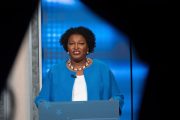
Craig Becker is a longtime lawyer for big labor. Among his clients have been the AFL-CIO and the Service Employees International Union (SEIU). When President Obama appointed him to the National Labor Relations Board, the independent federal regulatory agency that deals with union and employer compliance with federal labor laws, among other things, that nomination was rejected by the Democrat-controlled Senate. President Obama seemed very eager to have him on the NLRB. The President then gave the labor lawyer a recess appointment which allows him to serve through the current year. Minority Leader Nancy Pelosi, when Speaker, severely criticized this appointment.
The very hot political issue of “card check” has come before the NLRB in a case involving the Dana Corporation, which had agreed to a labor demand that workers voting for unionization could be approached by labor union operatives and asked to sign a pledge card, thus publicly placing the worker as voting for unionization. The counterpart in American elections would be if political operatives were allowed to approach voters and ask them to fill out their ballots before the election and hand them over to the operatives. Becker has recused himself, after being asked to do this many times before, from this particular case.
The loss of the secret ballot is one concern with this approach. A bigger concern is union intimidation of individual workers. Craig Becker has taken extreme views on the vital issue of votes to unionize workers. As counsel for labor unions, he said: “Just as U.S. citizens cannot opt against having a congressman, workers should not be able to choose against having a union as their monopoly-bargaining agent.” In other words, if one works for a company, he should not be able to vote against having a union represent him. Becker also views a secret ballot in unionization elections to be “profoundly undemocratic.” His position regarding the rights of employers to question the vote to unionize a work place is just as clearly biased:
Similarly, employers should have no right to raise questions concerning voter eligibility or campaign conduct. Because employers have no right to vote, they cast no ballots the significance of which can be diluted by the inclusion of ineligible employees. … Because employers lack the formal status either of candidates vying to represent employees or voters, they should not be entitled to charge that unions disobeyed the rules governing voter eligibility or campaign conduct. On the questions of unit determination, voter eligibility, and campaign conduct, only the employee constituency and their potential union representatives should be heard.
The only groups which Becker feels have standing to question union elections to become the bargaining agent in a workplace are the representatives of unions themselves. It seems to harken back, in some respects, to when Chicago gangs used to divvy up territory in the Windy City. Law-abiding citizens and police officers need not concern themselves with the process, they said — only the gangs involved have a legitimate interest in the gang boundaries.
Becker has recused himself from one particular case, but since he took his temporary “recess” appointment, the National Right to Work Foundation has filed 13 motions for him to recuse himself from matters before the board on the grounds of conflict of interest. Becker has failed to recuse himself from a number of cases, including cases in which he himself did extensive legal work for some of the parties before the NLRB like the SEIU. Aside from the normal standards of conflict of interest before tribunals (which require an officer who may have a judicial role in a proceeding to recuse himself from participating when he has a conflict of interest), the actions of Becker appear to conflict with the extra measure of ethical standards created by the Obama administration, which Becker signed and which provide: "I will not for a period of two years from the date of my appointment participate in any matter involving specific parties that is directly and substantially related to my former employer or former clients, including regulations and contracts."
Compounding the ethical problems for Becker, he has a long history of criticizing Right to Work groups such as the NLRW. He has worked not just for the ALF-CIO and SEIU, but also for ACORN, which has been associated over the last several years with a number of instances of questionable behavior. Ironically, many of the problems with ACORN have revolved around the integrity of voter registration, an issue which ties in closely with union “Card Check,” which would place the voting process to some extent in the hands of union organizers.
Despite Becker’s having been rejected two years ago by a Senate which was much more strongly controlled by his party, Obama has decided that he will try to get him confirmed as a member of the National Labor Relations Board before his term ends on December 31, 2011. What is one possible reason why Obama will re-nominate for a full term on the NLRB a man who has rejected his own administration’s ethical standards, who does not adhere to the ethical standards that federal judges do or which other members of the board on which he serves believes are proper, and who has made very controversial statements about the rights of employees and of employers, vis-a-vis the rights of labor unions? The SEIU donated $129 million to Obama and Democrats supported by Obama in the last two election cycles.
Congressman Darrell Issa (R-Calif.), who now chairs the oversight panel which reviews possible corruption in this area, has indicated that Chris Becker will have much closer scrutiny of the various connections he has in his temporary appointment, as well as of regulatory power, subpoenas which were not issued before to union groups, plus a severe examination of the apparent conflicts of interest which his recess appointment by Obama has created.
The appointment also has ramifications upon the Obama administration’s pronounced concern for making job creation a first priority in the next two years. Whatever the value of labor unions in protecting the rights of workers — an issue strongly contested by those who oppose union power — there is little doubt about the adverse effect of union organization upon the creation of industry and commerce in America or upon the decisions of employers to continue to maintain factories and other businesses in America.
It would have been encouraging if President Obama had at least respected the verdict passed by a Democrat Senate a year ago, and had instead sought a nominee which was acceptable to both labor and business.
Photo of Craig Becker from NLRB website



